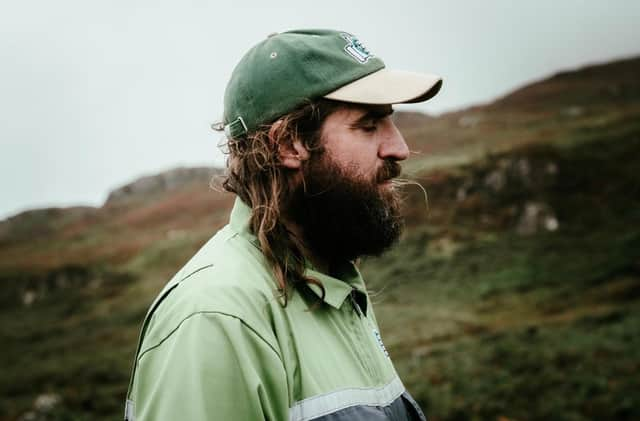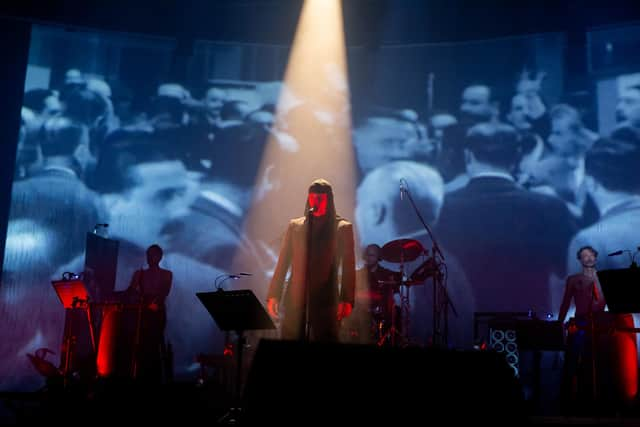Album reviews: Pictish Trail | Aldous Harding | Laibach | The Ninth Wave


Pictish Trail: Island Family (Lost Map/Fire) ****
Aldous Harding: Warm Chris (4AD) ***
Laibach: Wir Sind Das Volk (Ein Musical Aus Deutschland) (Mute) ***
The Ninth Wave: Heavy Like a Headache (Distiller Records) ***
Advertisement
Hide AdAdvertisement
Hide AdDespite living on an island for the past decade, Eigg dweller Johnny Lynch, aka Pictish Trail, confesses he is “not that much of an outdoors person” being more partial to the inside of a music venue. During the pandemic, however, Lynch came to love his island environment. Back in March 2020, he was the first artist to take part in the Scotsman Sessions, snug in his bothy studio with the waves crashing outside.
The thrusting electro indie sounds of Island Family beam directly from that environment, with the opening title track referencing Eigg’s Massacre Cave, where most of the island population was wiped out in a 16th century clan feud. Back in the 21st century, Lynch nurses his hangover after another island party on the mournful comedown of In The Land of the Dead, then gets back out on to the beach on the expansive, elemental Melody Something.
He indulges his sense of lo-fi play throughout with the fuzz arpeggios of Nuclear Sunflower Swamp and the bleeps and burps of analogue synthesizers embellishing the Krautrock propulsion of Natural Successor. Lynch sounds like a slightly unsettled Beck on the low-slung It Came Back, delivers a pseudo-island rap on the shuffling Remote Control, which occasionally veers off into the hurly burly, and rides the synth surf on the gonzo garage rock of Green Mountain.


Where Lynch is an energetic, extrovert host, New Zealand singer/songwriter Aldous Harding opens her fourth album with the appropriately titled Ennui, its central piano part never straying far beyond a couple of notes, with smoky brass and languorous backing vocals gradually folded in to the mercurial mix. Fever conveys attitude in a few brushstrokes, again using simple piano parts and brass.
Warm Chris is produced by PJ Harvey wingman John Parish, with contributions from Harding’s partner H Hawkline, drummer Seb Rochford and Sleaford Mods frontman Jason Williamson. Harding herself contains multitudes, shape-shifting her vocals to suit the song. She adopts a low-slung Lou Reed lassitude on Tick Tock, delivers breathy intimacy over the mellow acoustic picking of the title track, a beseeching keen on Passion Babe, a high, delicate, girlish vocal on the breezy, accessible Lawn and a variety of voices including a mannered alto, nasal sneer and a folky quaver on Leathery Whip. Amid the oblique intrigue, the Joni Mitchellesque yearning melody of She’ll Be Coming Round the Mountain is received with thanks.
Slovenian industrial rockers Laibach follow their Sound of Music covers album with a recording of their own musical, staged briefly pre-pandemic and about to be revived around Germany and the Balkans. Wir sind das Volk (We are the People) is based on the writings of German playwright Heiner Müller around childhood and fascism and in keeping with Laibach’s interrogation of nationalism and identity. Where the title phrase was once chanted at the fall of the Berlin Wall, it is now more readily associated with populist movements.
Even without a linear narrative, non-German speakers will have to go with the musical flow, from creepy lullaby Traumwald to the operatic pomp of German standard Flieger Grüß mir die Sonne, from doomy instrumentals and the Teutonic intoning of Ordnung und Disziplin to soaring choral piece Ich will ein Deutscher sein and the Weimar cabaret flourish of Das Lied vom einsamen Mädchen.
Advertisement
Hide AdAdvertisement
Hide Ad

Dive into The Ninth Wave pronto, as this Glasgow band is going on hiatus following the release of second album Heavy Like a Heartache, bowing out for now with a mixed bag of sleek synth pop, gothic electro rock, angsty anthems and glam strutting which suggest myriad directions for members to take as they pursue personal projects.
CLASSICAL
Purcell: Royal Odes (Alpha Classics) ****
The 24 odes composed by Purcell between 1680 and his death in 1695 embrace the essence of his genius, a wealth of expressive, structural and harmonic ingenuity held in check by a sheen of tuneful, heartening lyrical simplicity. They were dutiful in their intention, responding mostly to royal order, so the textual sentiments are duly ingratiating. The three in this album, featuring French ensemble Le Banquet Céleste under director Damien Guillon, are Welcome Odes: the first two, “From Those Serene and Rapturous Joys” and “Fly, Bold Rebellion”, for Charles II; the last, written in 1685, for the incoming James II. In the opening ode, the consummate ground-bass aria “Be welcome then great sir” is, itself, a moment of magic. But with instrumental playing throughout as energised as it is luxuriant, and richly-emotive vocal soloists, every one of these performances is stylish, elegant and fit for a king. Ken Walton
JAZZ
Avishai Cohen: Naked Truth (ECM) ****
There’s an understated yet lyrical and stately melancholy to this recording by the Israeli-born trumpeter Avishai Cohen and his quartet, a shorter (at little over half an hour) and more studied affair than the exuberant eclecticism and trippy electronics of his last album, Big Vicious. Cohen’s spare but velvety trumpet meditations in eight parts are framed meticulously and empathetically by pianist Yonathan Avishai, bassist Barak Mori and drummer Ziv Ravitz, all well-seasoned in each other’s company. The spare flicker and tap of Ravitz’s drums maintain an unhurried yet exorable forward motion, and open the longest section, Part IV, with stealthy rolling toms and cymbals. Yonathan Avishai’s piano, meanwhile, frames Cohen’s statements with chiming tension. Cohen’s closing recitation of Departure, a moving poem by Zelda Schneurson Mishkovsky, confirms the preceding music as a restrained yet heartfelt and immensely dignified ode to mortality, renunciation and casting off. Jim Gilchrist
A message from the Editor:
Thank you for reading this article. We're more reliant on your support than ever as the shift in consumer habits brought about by coronavirus impacts our advertisers.
If you haven't already, please consider supporting our trusted, fact-checked journalism by taking out a digital subscription at https://www.scotsman.com/subscriptions